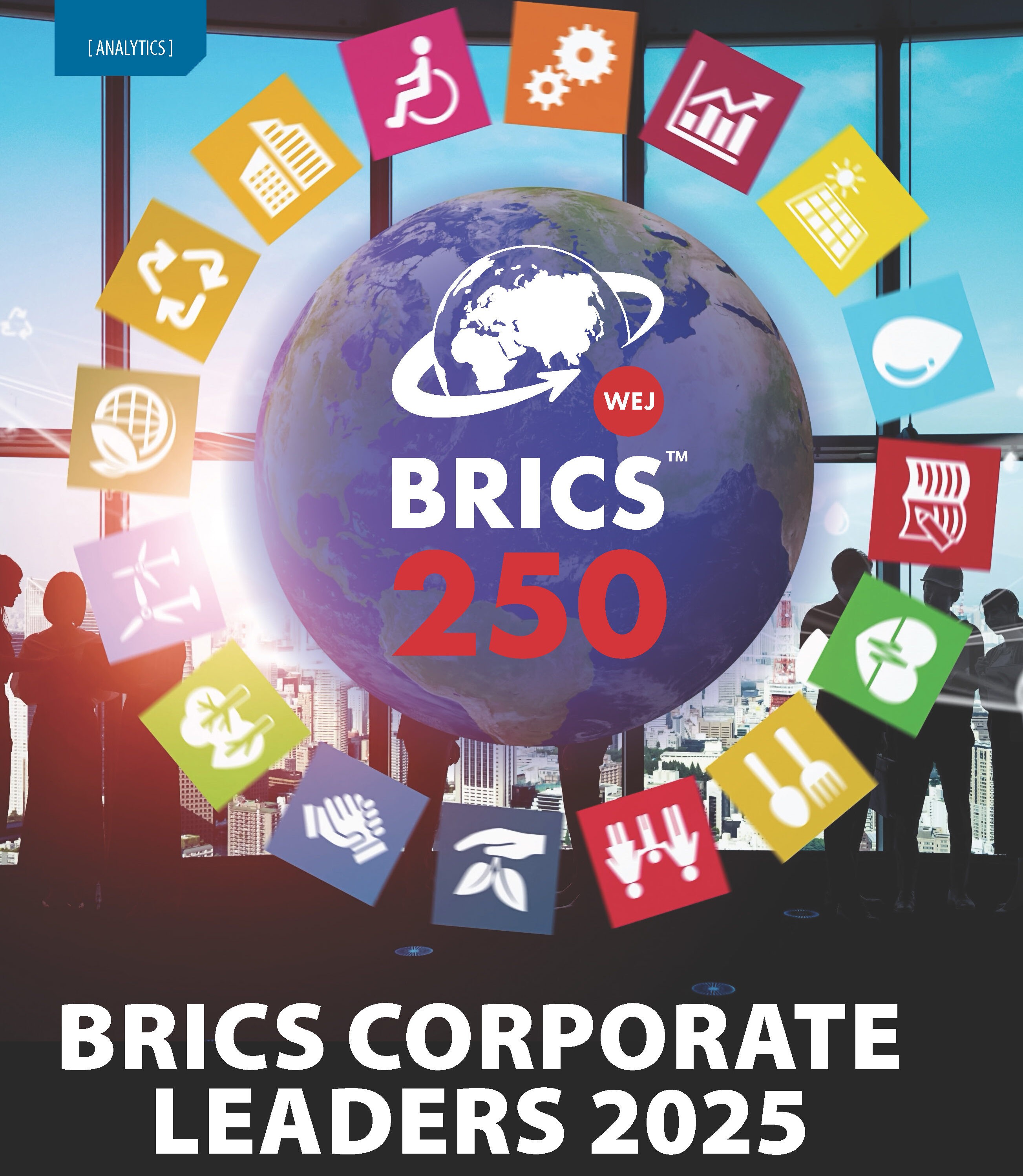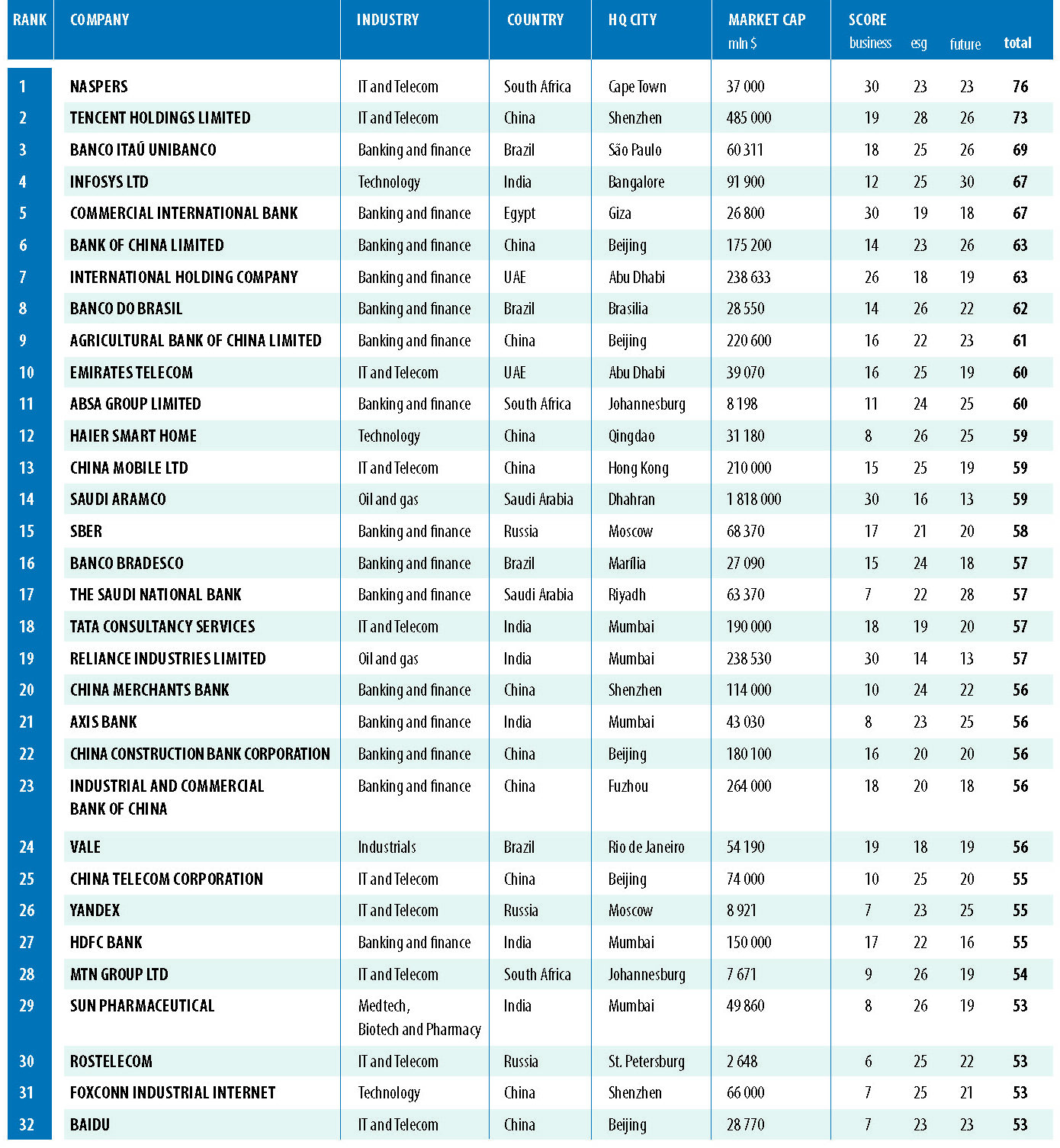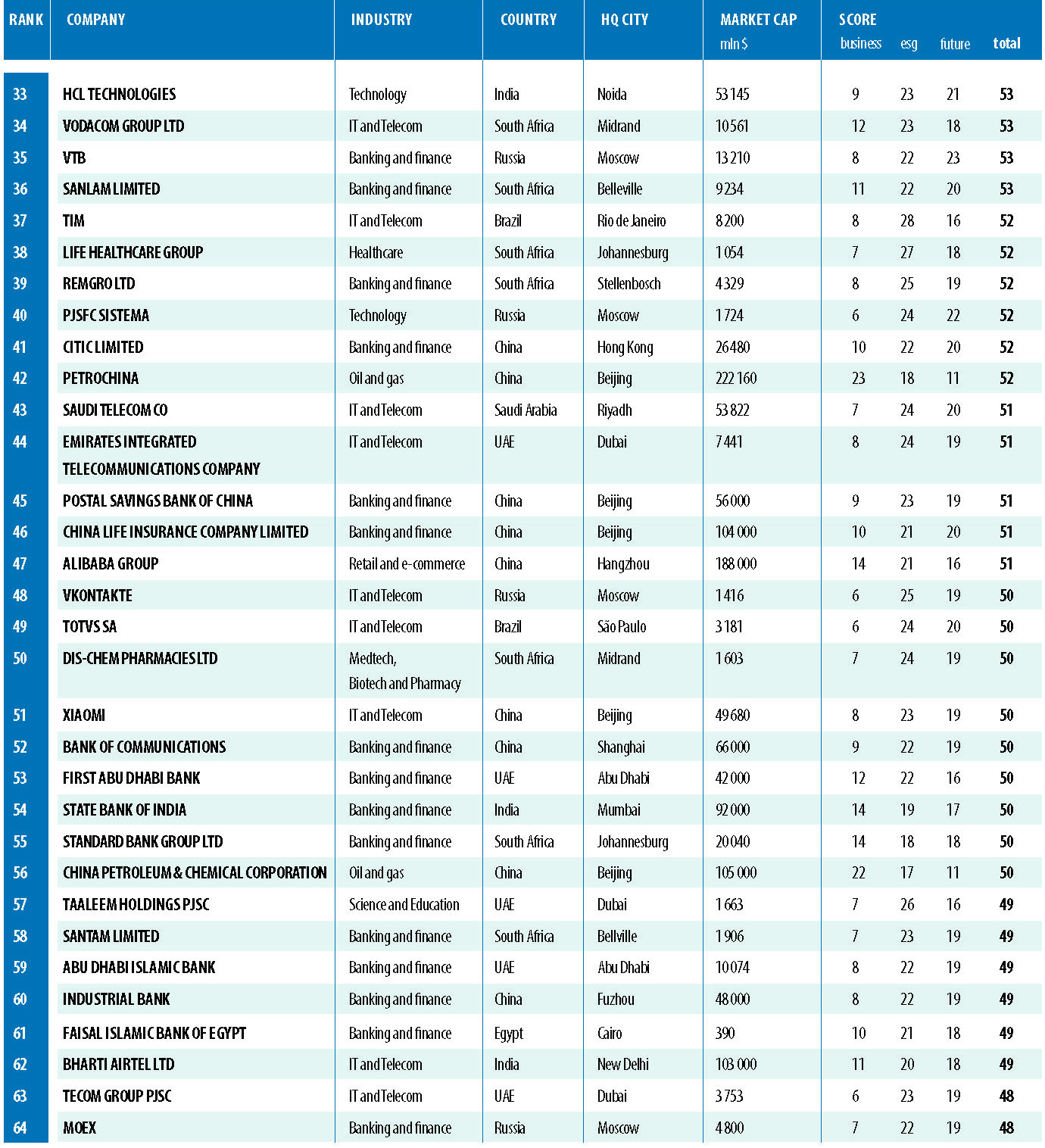BRICS 250: The Companies Shaping the Future of Sustainable Growth
In a world seeking new directions for growth, companies from BRICS nations are emerging as the driving force of global transformation. In 2024, the World Economic Journal introduced the inaugural edition of the BRICS Corporate Leaders (BRICS 250) ranking — a comprehensive review of the largest and most forward-looking corporations from BRICS countries. The updated 2025 edition will be released this autumn.
BRICS 250 is a unique business assessment tool that combines scale, sustainability, and impact. The ranking covers 250 leading companies from BRICS and BRICS+ countries, including China, India, Brazil, Russia, South Africa, as well as new members such as the UAE, Egypt, and Saudi Arabia.
Companies are evaluated across four key criteria:
• Financial Stability — revenue, assets, market capitalization;
• ESG Performance — environmental and social responsibility, governance transparency;
• Future Orientation — investment in innovation, digital transformation, adaptability to new markets;
• Global Significance — contribution to GDP, exports, employment, and cross-border projects.
The ranking reflects not only the size of a business but also its readiness to meet the challenges of the coming decade.
Who Topped the List Among BRICS 250 in 2024?
The first edition of BRICS 250 in 2024 clearly demonstrated: sustainable growth is possible only when financial performance goes hand in hand with a strong ESG strategy.
The top companies included both global multinationals and emerging regional giants:
• Naspers (South Africa) — digital media and investment;
• Tencent (China) — the region’s most influential tech ecosystem;
• Banco Itaú Unibanco (Brazil) — a benchmark in sustainable banking;
• Infosys (India) — a global IT transformation leader;
• CIB Egypt and IHC (UAE) — new BRICS+ entrants showcasing growth and openness.
1. NASPERS
Naspers is a multinational consumer internet group and one of South Africa’s largest companies. Founded in 1915, it has evolved from a local media business into a global internet and technology group, with significant investments in online classifieds, food delivery, fintech and e-commerce platforms. Naspers is notably the largest shareholder in Prosus, a global consumer internet group that holds stakes in companies like Tencent and Delivery Hero.
Naspers’ ESG efforts focus on sustainable development and responsible corporate citizenship. The company emphasises reducing its carbon footprint, enhancing data privacy and security, promoting diversity and inclusion, and supporting local communities. Naspers also prioritises good governance, aiming for transparency, accountability and ethical business practices across its operations and investments. Its ESG initiatives are aligned with global sustainability goals, aiming for a positive impact on both society and the environment.
2. TENCENT HOLDINGS LTD.
Tencent Holdings Ltd. is a Chinese multinational conglomerate and one of the world’s largest technology companies. Founded in 1998 and headquartered in Shenzhen, Tencent operates across various sectors including social networking, gaming, fintech, cloud computing and AI. Tencent’s core businesses revolve around its popular
social media platform WeChat, its leading online gaming portfolio (featuring titles like Honor of Kings and PUBG
Mobile) and its digital payment service WeChat Pay. Tencent is also a significant player in cloud services and artificial intelligence, driving innovation across industries. The company invests extensively in high-tech sectors,
including autonomous driving, quantum computing, and healthcare technology, as well as its strategic stakes in
global tech giants like Tesla, Spotify, and Snap Inc.
Tencent’s ESG policies focus on sustainability, social responsibility and robust governance. The company is committed to reducing its carbon emissions, developing eco-friendly data centres and adopting renewable energy sources. Socially, Tencent invests in education, healthcare and poverty alleviation in China while promoting digital inclusion globally. Its governance strategy emphasises transparency, ethics and compliance with international standards, reflecting its role as a global tech leader.
3. BANCO ITAÚ UNIBANCO
Banco Itaú Unibanco is one of the largest financial institutions in Latin America and a key player in the global banking industry. Headquartered in São Paulo, Brazil, the bank was formed in 2008 through the merger of Banco
Itaú and Unibanco. Itaú Unibanco offers a wide range of services including retail, commercial and investment
banking, as well as insurance, asset management and credit cards. The bank operates in over 18 countries and
serves millions of customers across its digital and physical platforms.
The bank is known for its focus on digital transformation, with significant investments in fintech, AI, and blockchain technology to enhance customer experiences and operational efficiency.
Itaú Unibanco has a strong commitment to ESG principles. Environmentally, the bank aims to reduce its carbon footprint, finance green projects and support sustainable development in Brazil and beyond. Socially, Itaú Unibanco invests in education, entrepreneurship and social inclusion initiatives, particularly focusing on underserved communities. In terms of governance, the bank prioritises transparency, ethical behaviour and strong corporate governance practices, ensuring that its operations align with global best practices and contribute positively to society and the environment.
4. INFOSYS LTD.
Infosys Ltd. is a prominent global IT services and consulting firm based in Bangalore, India. Established in 1981, the company offers a broad array of services, including software development, business consulting, technology
solutions and outsourcing. It caters to a variety of industries, such as finance, manufacturing, telecommunications,
retail and healthcare. Infosys is particularly recognized for its capabilities in digital transformation, cloud solutions, AI and data analytics, enabling businesses to modernise and innovate. Infosys operates in more than 50 countries and employs over 300,000 people globally.
The company has committed to ambitious sustainability objectives, including achieving carbon neutrality and cutting energy consumption through renewable energy adoption. Its social initiatives focus on education, healthcare and skill development, particularly for disadvantaged communities. In governance, Infosys shows dedication to transparency, ethical conduct and robust corporate governance by international standards.
5. COMMERCIAL INTERNATIONAL BANK
Commercial International Bank (CIB), Egypt’s largest private-sector bank, has been a leader in corporate and retail banking since its founding in 1975. Offering a full spectrum of financial services — including personal banking, corporate lending, trade finance and investment banking — CIB leverages technology to improve digital banking and enhance customer experiences.
Operating both domestically and internationally, and serving millions of clients, the bank continues to invest in fintech and digital solutions to remain competitive.
CIB shows commitment to ESG principles, focusing on environmental sustainability by cutting carbon emissions and funding renewable energy projects. Socially, it supports initiatives in education, financial inclusion and community development, particularly targeting youth and entrepreneurship. The bank upholds strong governance practices, emphasising transparency, ethics, and compliance with both local and global standards.
6. BANK OF CHINA LTD.
Bank of China Limited (BOC), one of China’s largest and oldest financial institutions, was founded in 1912. As a leading state-owned bank, BOC provides a broad range of financial services, including corporate and personal banking, investment banking, insurance and asset management. The bank has a significant global presence, operating in over 50 countries and regions, and serves a vast customer base both domestically and internationally.
The company continues to drive innovation through investments in digital banking and fintech solutions to remain competitive in the fast-evolving financial landscape.
Bank of China’s sustainable development strategy stands out for its strong focus on sustainable finance. The bank is involved in financing green projects and reducing its environmental impact. Socially, BOC supports initiative in the fields of financial inclusion, education and poverty alleviation. In terms of governance, the bank adheres to strict standards of transparency, ethics and strong corporate governance, ensuring compliance with both domestic and international regulations.
Ranking Table 2024 — BRICS 250 / Top 64
Expanded Scope, AI-Powered Insights, and Next-Gen ESG Tools
The 2025 edition of BRICS 250 introduces a series of critical upgrades.
Key updates include:
• Sectoral classification: Companies will be grouped into six major sectors — finance, technology, energy, industry, agri-business, and healthcare.
• Introduction of the “ESG Composite Score”, aggregating environmental, social, and governance metrics.
• Implementation of SustainaNet AITE — a cutting-edge AI-based platform for real-time ESG signal monitoring, resilience assessment, and deep benchmarking of corporate sustainability.
250 COMPANIES — ONE SUSTAINABLE FUTURE: COMING SEPTEMBER 2025
The updated BRICS Corporate Leaders 2025 ranking will be published in the September 2025 edition of the World
Economic Journal.
Follow updates and methodology at:
https://world-economic.com/
For participation, partnerships, and nominations:
awards@world-economic.com
Don’t miss the most comprehensive research on BRICS corporate leadership — only in the World Economic Journal
WEJ MEDIAKIT- ENG
Stay Ahead with World Economic Journal — Anytime, Anywhere
Get full access to expert insights, global analysis, and exclusive features from every issue of World Economic Journal.
Download the journal on your preferred platform:
Google Play: WEJ on Magzter
Magzter Web: World Economic Journal on Magzter
- Apple App Store: World Economic Journal Magazine
Subscribe now and never miss an issue. Knowledge. Insight. Impact.
Available in Leading Digital Libraries Worldwide
World Economic Journal is not only available through major digital platforms — it is also part of hundreds of public, academic, and institutional digital libraries across the globe.
You can access the journal through:
London Public Library, Toronto Public Library, ZINIO-powered U.S. and Canadian networks
British Council Libraries, Universities such as Southampton, Leeds, and DuPage
Major city libraries in Washington, Chicago, Philadelphia, Houston, Los Angeles, Berlin, Tokyo, Illinois, Switzerland, Malta, Johannesburg — and many more.
We are proud to be present in the global knowledge ecosystem — from government research centers to digital reading networks in over 70 countries.
If your institution has a digital library, World Economic Journal is likely already there.





